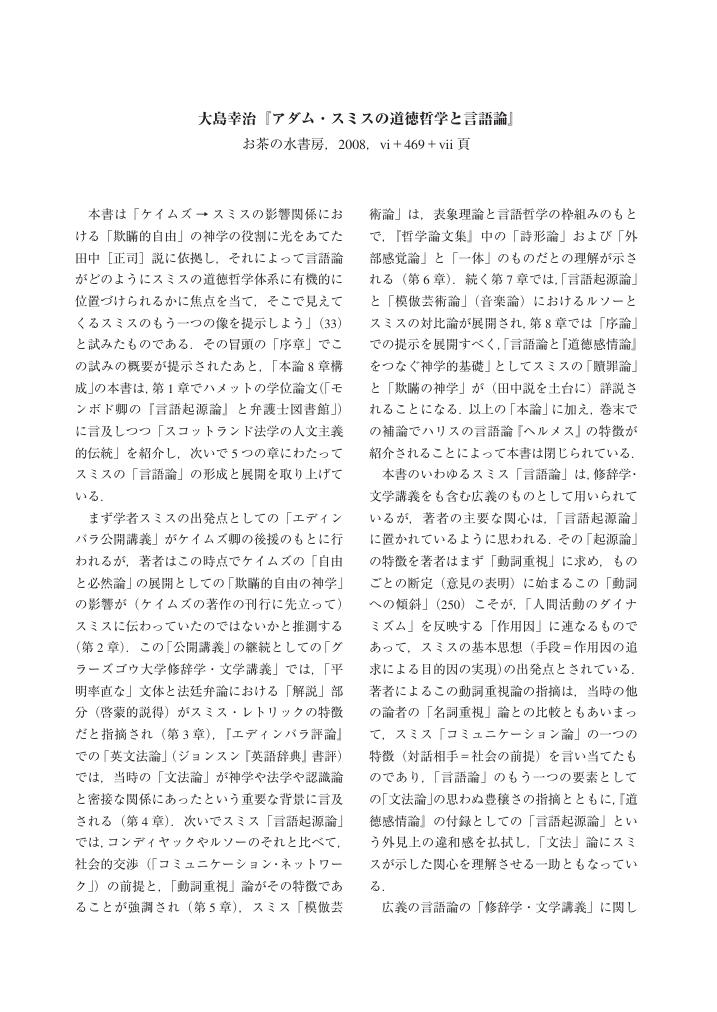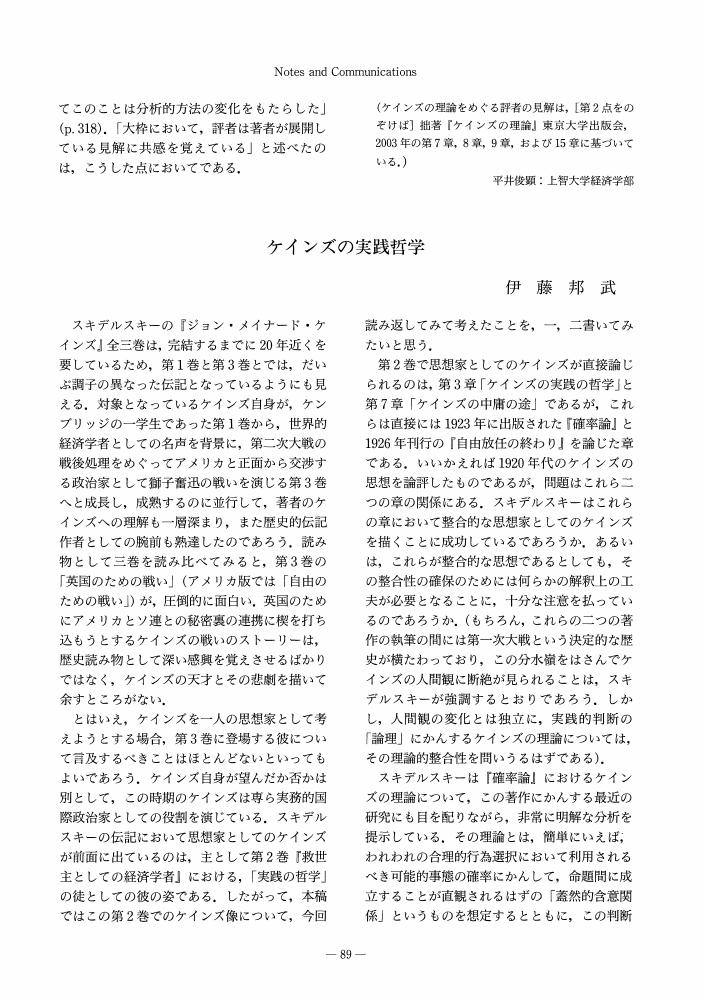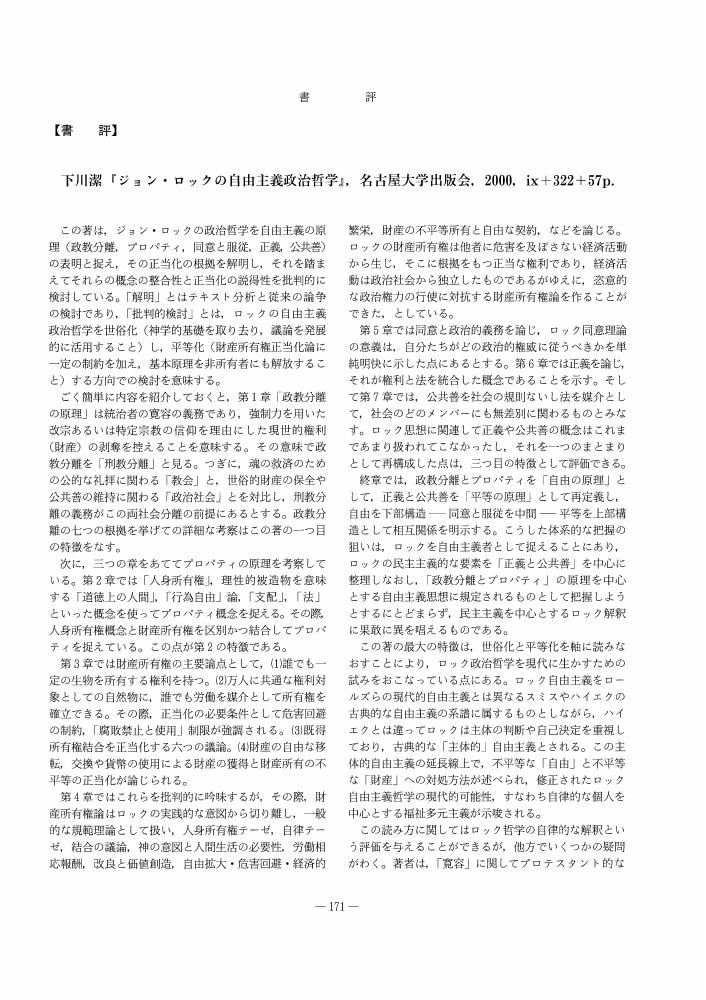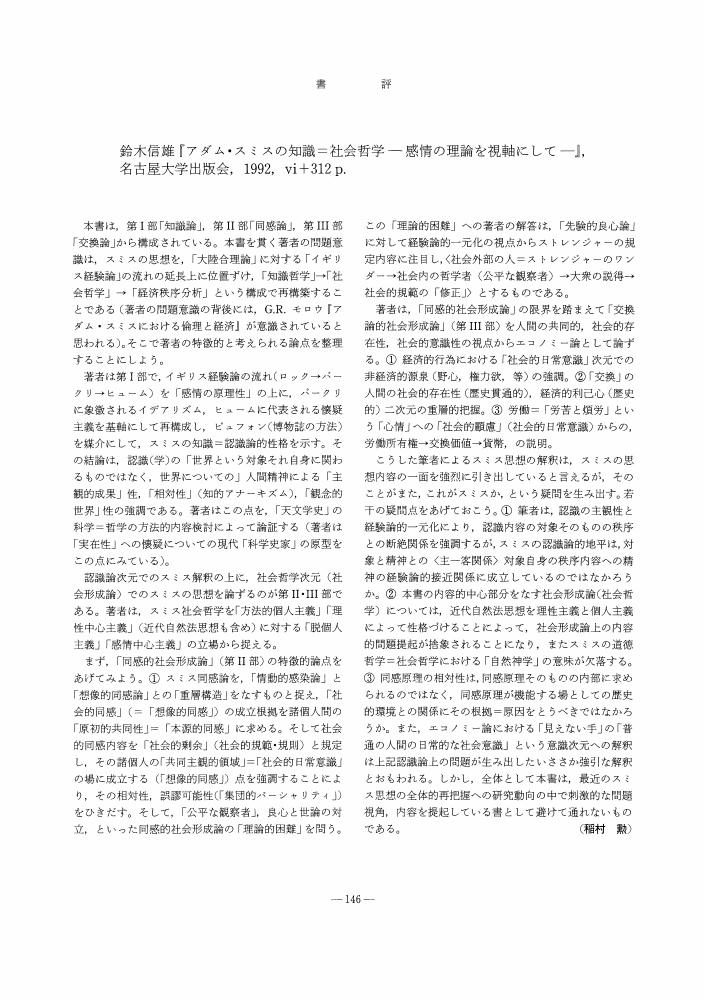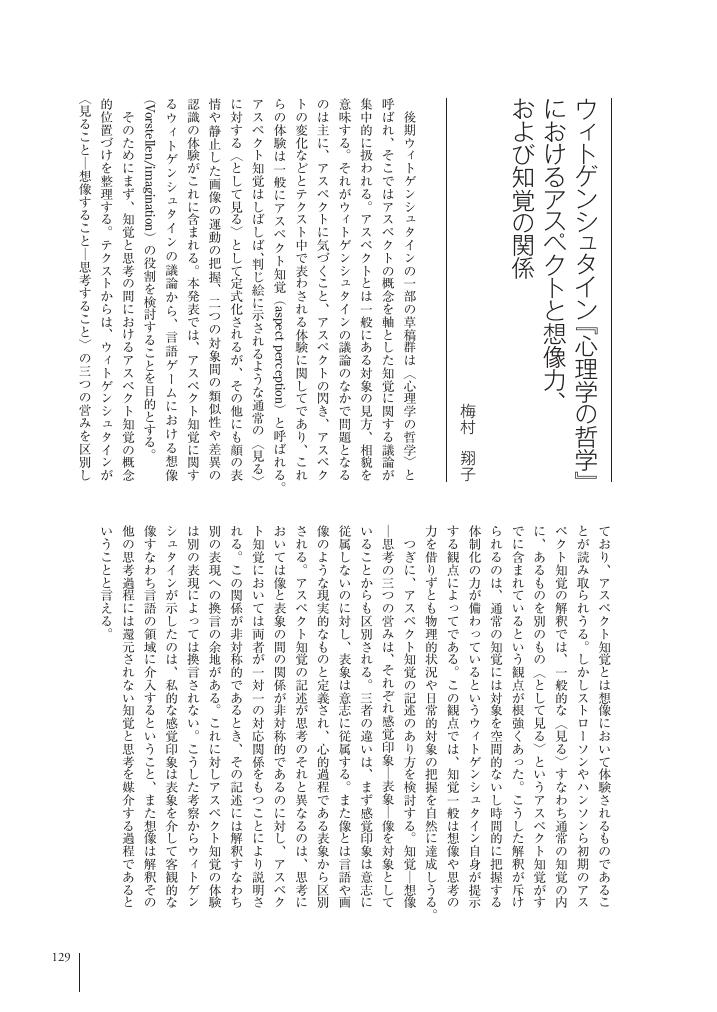- 著者
- 西部 忠
- 出版者
- 経済学史学会
- 雑誌
- 経済学史研究 (ISSN:18803164)
- 巻号頁・発行日
- vol.56, no.1, pp.154-156, 2014 (Released:2019-08-24)
1 0 0 0 OA 塩野谷祐一『経済哲学原理――解釈学的接近』東京大学出版会, 2009年, ix+445頁
- 著者
- 有江 大介
- 出版者
- 経済学史学会
- 雑誌
- 経済学史研究 (ISSN:18803164)
- 巻号頁・発行日
- vol.52, no.2, pp.149-150, 2011 (Released:2019-10-28)
- 著者
- 篠原 久
- 出版者
- 経済学史学会
- 雑誌
- 経済学史研究 (ISSN:18803164)
- 巻号頁・発行日
- vol.52, no.2, pp.153-154, 2011 (Released:2019-10-28)
- 著者
- 篠原 久
- 出版者
- 経済学史学会
- 雑誌
- 経済学史研究 (ISSN:18803164)
- 巻号頁・発行日
- vol.52, no.1, pp.102-103, 2010 (Released:2019-10-25)
- 著者
- 山崎 聡
- 出版者
- 経済学史学会
- 雑誌
- 経済学史研究 (ISSN:18803164)
- 巻号頁・発行日
- vol.51, no.2, pp.116-117, 2009 (Released:2019-08-08)
1 0 0 0 OA ケインズの実践哲学
- 著者
- 伊藤 邦武
- 出版者
- 経済学史学会
- 雑誌
- 経済学史学会年報 (ISSN:04534786)
- 巻号頁・発行日
- vol.45, no.45, pp.89-91, 2004 (Released:2010-08-05)
1 0 0 0 OA 塩野谷祐一『経済と倫理-福祉国家の哲学』東京大学出版会, 2002, ix; 444頁
- 著者
- 有江 大介
- 出版者
- 経済学史学会
- 雑誌
- 経済学史学会年報 (ISSN:04534786)
- 巻号頁・発行日
- vol.43, no.43, pp.112-113, 2003 (Released:2010-08-05)
- 著者
- 岡村 東洋光 下川 潔
- 出版者
- 経済学史学会
- 雑誌
- 経済学史学会年報 (ISSN:04534786)
- 巻号頁・発行日
- vol.39, no.39, pp.171-173, 2001 (Released:2010-08-05)
1 0 0 0 OA 伊藤邦武『ケインズの哲学』, 岩波書店, 1999, vii+242p.
- 出版者
- 経済学史学会
- 雑誌
- 経済学史学会年報 (ISSN:04534786)
- 巻号頁・発行日
- vol.38, no.38, pp.175-177, 2000 (Released:2010-08-05)
1 0 0 0 OA 新古典派経済学の哲学的源流
- 著者
- 山本 英司
- 出版者
- The Japanese Society for the History of Economic Thought
- 雑誌
- 経済学史学会年報 (ISSN:04534786)
- 巻号頁・発行日
- vol.37, no.37, pp.70-81, 1999 (Released:2010-08-05)
- 参考文献数
- 27
Much criticism has been levied against Neo-Classical Economics (NCE). Currently, even the followers of NCE have declared the need for alternative economics.This paper examines the philosophical origins of NCE. In the process of making this examination, we establish a fundamental critique against NCE, which has survived through the ‘evolutionary’ process.This paper points out the philosophical origins of NCE. First, the theoretical aspect of NCE (that is, methodological individualism), originated in Descartes. ‘Homo Economicus’ (rational economic man) and the optimum principle are derived from Descartes. Notably, the logic of Descartes ultimately depends on the proof of the existence of God. This appropriation is scandalous, in that it throws into question the very rationality of Descartes' and Neo-Classical Economics' foundations. Second, the empirical aspect (i. e., falsificationism) originated in Popper. This appropriation gave the economics a scientific aspect, insist the followers of NCE. Although Kuhn's ‘Scientific Revolutions Theory’ and ‘Paradigm Theory’ challenged falsificationism, Popper's pupil Lakatos modified Popper's theory and advocated ‘Methodology of Scientific Research Programmes’ (MSRP). In turn, this modification made falsificationism seem innocuous.This paper ends with suggestions for alternative economics, referenced with irony from Descartes and Popper: Popper's original bold trials and errors (viz., conjectures and refutations), and Descartes' ‘temporary morality’.
1 0 0 0 OA 只腰親和『「天文学史」とアダム・スミスの道徳哲学』, 多賀出版, 1995, 261p.
- 著者
- 長尾 伸一
- 出版者
- 経済学史学会
- 雑誌
- 経済学史学会年報 (ISSN:04534786)
- 巻号頁・発行日
- vol.34, no.34, pp.164, 1996 (Released:2010-08-05)
1 0 0 0 OA 桂木隆夫『市場経済の哲学』, 創文社, 1995, xii+199+12p.
- 著者
- 只腰 親和
- 出版者
- 経済学史学会
- 雑誌
- 経済学史学会年報 (ISSN:04534786)
- 巻号頁・発行日
- vol.34, no.34, pp.154, 1996 (Released:2010-08-05)
1 0 0 0 OA アダム・スミスとストア哲学
- 著者
- 伊藤 哲
- 出版者
- The Japanese Society for the History of Economic Thought
- 雑誌
- 経済学史学会年報 (ISSN:04534786)
- 巻号頁・発行日
- vol.32, no.32, pp.48-59, 1994 (Released:2010-08-05)
This article intends to reconsider the relationship between stoic philosophy and the theory of self-command in The Theory of Moral Sentiments.Hitherto, in Western studies, it has been thought that Smith had treated stoic philosophy consistently from the first edition to the sixth edition. However, in my view, concerning the theory of self-command, Smith seemed to criticize stoic philosophy in the sixth edition.In the first edition (1759), Smith comprehended that the virtue of perfect self-command was regarded as stoical heroism or, as it were, stoic virtue. In addition, he realized that the impartial spectator had to maintain a stoic magnanimity. Moreover, in the second edition (1761), according to the supplement of Epictetus' quotation in Part III, Smith emphasized stoic virtue as a means towards of the perfection of human nature. Therefore, with regard to the perfection of human nature, Smith recognized self-command as an integral part of the theory of virtue. However, in the sixth edition (1790), Smith evidently criticized the stoical apathy, which is not true self-command but lack of sensibility. Smith noticed that it was so dangerous to restrain the natural course of passions, and that the habitual most perfect self-command, though it was acquired via many hardships, might tend to fall into insensibility. Hence, Smith pointed out the proper relationship between self-command and sensibility in practical morality.
- 著者
- 長尾 伸一
- 出版者
- 経済学史学会
- 雑誌
- 経済学史学会年報 (ISSN:04534786)
- 巻号頁・発行日
- vol.31, no.31, pp.161, 1993 (Released:2010-08-05)
- 著者
- 稲村 勲 鈴木 信雄
- 出版者
- 経済学史学会
- 雑誌
- 経済学史学会年報 (ISSN:04534786)
- 巻号頁・発行日
- vol.31, no.31, pp.146-147, 1993 (Released:2010-08-05)
- 著者
- 山崎 怜
- 出版者
- 経済学史学会
- 雑誌
- 経済学史学会年報 (ISSN:04534786)
- 巻号頁・発行日
- vol.25, no.25, pp.71, 1987 (Released:2010-08-05)
1 0 0 0 OA ウィトゲンシュタイン『心理学の哲学』 におけるアスペクトと想像力、 および知覚の関係
- 著者
- 梅村 翔子
- 出版者
- 美学会
- 雑誌
- 美学 (ISSN:05200962)
- 巻号頁・発行日
- vol.68, no.2, pp.129, 2017 (Released:2019-01-02)
1 0 0 0 OA ヘーゲルの芸術哲学における文化「翻訳」的思索 ゲーテ『西東詩集』受容の再考
- 著者
- 髙藤 大樹
- 出版者
- 美学会
- 雑誌
- 美学 (ISSN:05200962)
- 巻号頁・発行日
- vol.67, no.2, pp.125, 2016 (Released:2018-01-01)
- 著者
- 八幡 さくら
- 出版者
- 美学会
- 雑誌
- 美学 (ISSN:05200962)
- 巻号頁・発行日
- vol.67, no.1, pp.25, 2016 (Released:2017-07-18)
In Schellings Philosophie der Kunst (1802-03, 1804-05) erklärt er das Absolute in der Form der Kunst nach dem System der Identitätsphilosophie. Er führt die Gattungstheorie ein und bezeichnet die Tragödie als das höchste Genre der redenden Kunst. Schelling konzentriert sich dabei auf die griechische Tragödie: Er lobt Prometheus als „das wahre Urbild der Tragödie“ (SWV 709) und gibt dieselbe Bewertung Sophokles’ Ödipus. Bei Schelling kann die griechische Tragödie durch den Sieg zwischen Freiheit und Notwendigkeit die Indifferenz darstellen. Schelling sieht die menschliche Freiheit im Sieg des Helden gegen Fatum und durch sein Unterliegen. In dieser Abhandlung diskutiere ich wie die griechische Tragödie die menschliche Freiheit in der Indifferenz zwischen Freiheit und Notwendigkeit realisieren kann, indem ich die Tragödientheorie Schellings in den Philosophischen Briefen über Dogmatismus und Kriticismus (1795) und der Philosophie der Kunst zusammenfasse, und seine Analyse des Ödipus prüfe. In der Philosophie der Kunst wird der tragische Held als Symbol des tragischen Erhabenen gesehen. Daraus schließe ich, dass der Gedanke der menschlichen Freiheit, die in den Philosophischen Briefen durch Annahme der freiwilligen Strafe realisiert wird, die Basis der Tragödientheorie in der Philosophie der Kunst darstellt, und dass man seine Tragödientheorie als Theorie der menschlichen Freiheit verstehen kann.
1 0 0 0 OA シュマルゾウ芸術学の哲学的源泉 : 十九世紀における運動と演算
- 著者
- 金田 千秋
- 出版者
- 美学会
- 雑誌
- 美学 (ISSN:05200962)
- 巻号頁・発行日
- vol.66, no.1, pp.65-76, 2015-06-30 (Released:2017-05-22)
This paper attempts to reveal the philosophical origins of August Schmarsow's theorie of arts in Grundbegriffe der Kunstwissenschaft (1905). In the 1870s, young Schmarsow studied philosophy under the direction of Ernst Laas at the University of Strassburg. His doctoral dissertation, titled Leibniz und Schottelius, suggests his specialized knowledge of G.W.Leibniz. Moreover, Laas was a disciple of Adolf Trendelenburg(1802-1872), a now forgotten, but formerly influential professor of philosophy at the University of Berlin. Trendelenburg's philosophy was founded on the premise that every philosophical category is essentially based on the concept of motion. In Grundbegriffe, Schmarsow presented an esthetic doctrine maintaining that the fundamental esthetic categories - symmetry, proportion and rhythm - are founded on the motion of the human body. This paper examines whether Schmarsow's methods were influenced by Leibniz's and Trendelenburg's thoughts.



